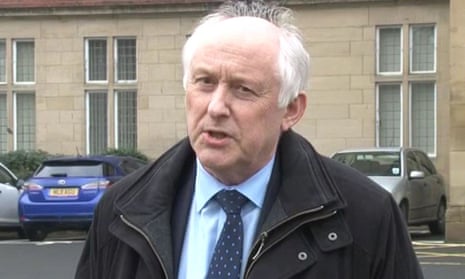The longest-serving NHS hospital boss has been sacked for gross misconduct and is being investigated by the service’s internal anti-fraud police.
Sir Leonard Fenwick was dismissed by the board of Newcastle upon Tyne hospitals foundation trust after 39 years for misconduct involving “inappropriate behaviour, use of resources and a range of governance issues”.
The trust said it could not elaborate on the nature of Fenwick’s misdemeanours because it had asked NHS Protect, the anti-fraud service, to look into its “concerns”.
The trust is one of the biggest in the NHS. It runs Newcastle’s two main acute hospitals, the Freeman and Royal Victoria Infirmary, as well as the city’s children’s and dental hospitals, fertility service and campus for ageing and vitality.
Fenwick, 70, had worked in the NHS since joining as a management trainee in 1965 at the age of 18. In 1977 he became the chief executive of the Freeman group of hospitals, and he stayed in charge when a merger of three teaching hospitals led to the trust’s creation.
Fenwick was sent on extended leave on 12 January and the trust called in an independent firm of human relations specialists from outside the north-east to investigate what it called “a number of very serious issues raised by different sources that were brought to the attention of the trust”. Other, also unspecified, matters came to light during that inquiry.
The findings of the investigation were followed by a two-day disciplinary hearing in May, after which the trust decided to sack him.
“This decision was not taken lightly, but made after very careful, lengthy and detailed consideration of the investigation report and Sir Leonard’s response to the allegations,” the trust said in a statement.
He appealed against the decision and the trust convened a second, different panel to consider his future. However, “after further careful, lengthy and detailed consideration the panel has decided to uphold the original disciplinary panel’s decision”.
It added: “Due to the serious nature of the issues, the trust was required to report a number of concerns to NHS Counter Fraud and Security Management Services, known as NHS Protect. As a result, it would be inappropriate for the trust to make any further comment on this matter.”
The Health Service Journal reported that the trust launched an inquiry after its chair, Kingsley Smith, received a letter in January from someone who had recently stopped working for it.
The journal’s website claimed that the letter alleged that Fenwick had “engaged in bullying and abusive behaviour towards an employee in public on multiple occasions; read or ‘interrogated’ staff emails; and made inappropriate comments concerning a member of staff’s daughter and a senior person in the NHS nationally”.
During his many years in charge of the trust, Fenwick gained a reputation for what observers said was his idiosyncratic style of leadership. For example, Newcastle was the only one of the 240 NHS trusts in England to have no dedicated communications team to handle media inquiries. Instead, requests for information or statements went directly to his office.
When the Care Quality Commisison inspected the trust last year, it rated its services as outstanding – a judgment that included its leadership.
In March, the trust denied that Fenwick’s removal from his post was related to stories in national newspapers that he was ousted after moving to suspend two male consultants who were allegedly having sex with junior female colleagues, sometimes during work time and including on hospital premises.
It was reported that Smith and a nonexecutive member of the trust’s board intervened and decided that the pair could keep their jobs.
